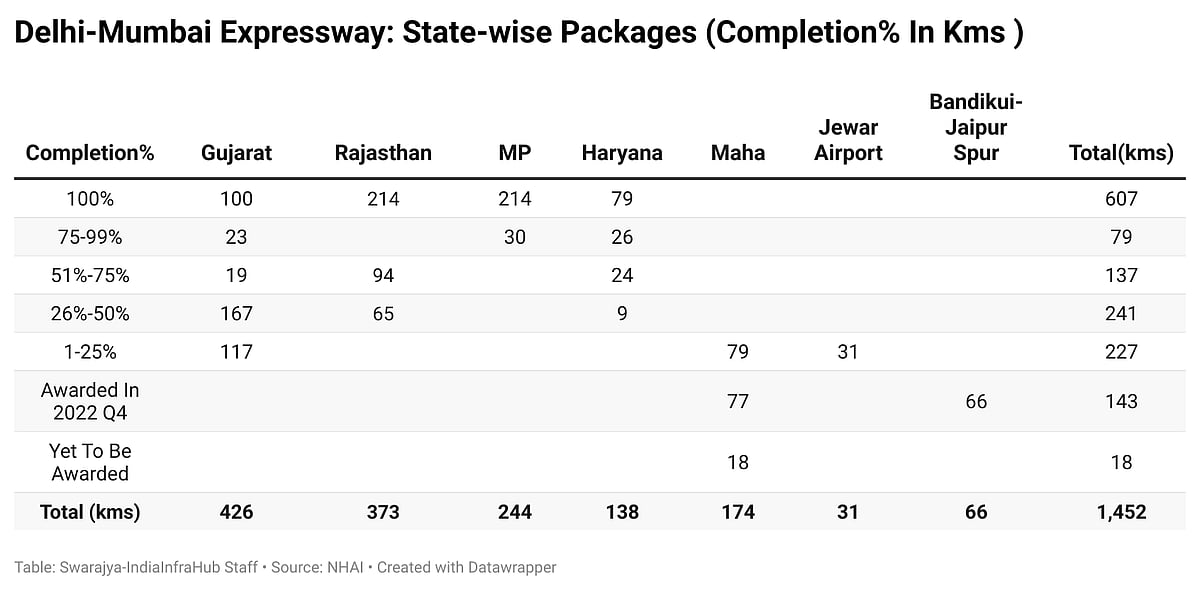Snapshot
-
An analysis by Indian InfraHub reveals that construction of 610 kms of the 1350 kms greenfield Delhi-Mumbai expressway is complete. Another 79 kms are in the advanced stage of construction.
With 214 kms already completed and another 30 kms in the advance state of completion, Madhya Pradesh is likely to the first state which completes all packages within its border.
Prime Minister Narendra Modi is soon likely to inaugurate the Sohna(near Gurugram)-Dausa stretch of the ambitious Delhi-Mumbai Expressway.
With the completion of all the nine packages totalling 293 kms between Sohna (Haryana) to Dausa (Rajasthan), the stretch is ready to opened officially for commuters.
PM Modi laid the foundation stone for the greenfield expressway project on March 9, 2019.
At nearly 1350 kms, it will be India’s longest expressway and will reduce travel time between Delhi and Mumbai from 24 hours to 13 hours. As part of the project, a 30 km 6 lane connectivity is being constructed between Noida’s under construction Jewar Airport and DND-Faridabad-Ballabhagh Bypass KMP. A 67 km accessed-controlled road is also being developed from Bandikui in Rajasthan to state capital Jaipur.
The new highway is being built at an estimated cost of Rs 103,000 crore. The highway will originate near Gurugram at Sohna and terminate at Mumbai. The expressway will cut the distance between the national and financial capital of India by 280 kms.
The new alignment for the Delhi to Mumbai road was planned mainly to provide seamless connectivity between the two cities and facilitate movement of freight.
The hinterland route was finalised due to its cost effectiveness, as the expense on land acquisition for the new alignment is significantly lower than what the government would have incurred if it had expanded the existing Delhi-Mumbai corridor.
The expressway will traverse through five states: Haryana, Rajasthan, Madhya Pradesh, Gujarat and Maharashtra.

The National Highways Authority of India (NHAI), the nodal agency for the expressway project, is executing it through 52 different packages for the main carriage way (all packages except one have been awarded). The two spurs developed as part of the project – Jewar Airport to KMP bypass and Bandikui to Jaipur have also been awarded.
As part of its strategy to minimise single-contractor dependance, NHAI picked 29 different construction firms for the project.
G R Infraprojects Limited, an emerging player in infrastructure sector, was awarded 8 packages totalling 290 kms. H G Infra Engineering was awarded 4 packages.

An analysis by Swarajya reveals that construction of 610 kms of the greenfield expressway is complete. Another 79 kms are in the advanced stage of construction. With 214 kms already completed and another 30 kms in the advance state of completion, Madhya Pradesh is likely to the first state which completes all packages within its border.
NHAI is likely to focus on expediting the work in the entire 174 kms in Maharashtra and over 200 kms out of the 426 kms of the expressway in Gujarat.

Out of the 54 packages, 53 have been awarded. Only one package (18 kms stretch in Maharashtra) is yet to be awarded)
Due to land acquisition challenges and studied indifference of the previous MVA government in Maharashtra, NHAI could complete awarding 4 packages only in the second half of 2022.

A comprehensive status tracker of all the 54 packages across 5 states is below. An analysis of 30-odd under construction packages suggests that the project is likely to reach completion stage by the first quarter of 2024.

